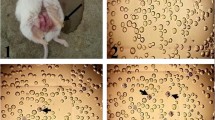Abstract
The effects of intraperitoneal administration of OK-432 on tumor cells in ascites, in relation to the infiltration of effector cells and on the immune reponses of the host, particularly, with regard to immune suppressive mechanisms, were investigated in 25 patients with cancerous ascites. The effects of OK-432 depended on frequency of the repeated and continuous administrations through a tube placed in the peritoneum during laparotomy. Infiltrations of neutrophils and lymphocytes were observed in the ascites within a short period after the administration and monocyte infiltration followed. Disappearance of tumor cells correlated well with the infiltration of these cells. No marked changes in the proliferative responses of peripheral blood lymphocytes were noted and decreases in serum inhibitory factor levels in sera were observed in patients given larger doses of OK-432. A marked reduction in Concanavalin-A-induced suppressor cell activities was observed after OK-432 administration. OK-432 administration probably leads to a disappearance of tumor cells by enhancing peritoneal effector cell activities and by inhibiting the induction of suppressor cell activities, in a dose dependent manner.
Similar content being viewed by others
References
Uchida A, Hoshino T. Clinical studies on cell mediated immunity in patients with malignant disease. I. Effected immunotherapy with OK-432 on lymphocyte subpopulation and phytomitogen responsivenessin vitro. Cancer 1980: 45: 476–483.
Ishii Y, Yamaoki H, Toh K, Kikuchi K. Inhibition of tumor growthin vivo andin vitro by macrophages from rats treated with a streptococcal preparation, OK-432. Gann 1976: 67: 115–119.
Uchida A, Mickche M. Intrapleural administration of OK-432 in cancer patients: Activation of NK cells and reduction of suppressor cells. Int J Cancer 1983; 31: 1–5.
Matsubara S, Suzuki F, Ishida N. Induction of immune interferon in mice treated with a bacterial immunopotentiator, OK-432. Cancer Immunol Immunother 1979; 6: 41–45.
Katano M, Torisu M. Neutrophil-mediated tumor cell destruction in cancer ascites. Cancer 1982; 50: 62–68.
Watanabe Y, Iwa T. Clinical value of immunotherapy for lung cancer by the Streptococcal preparation of OK-432. Cancer 1984; 53: 248–253.
Torisu M, Katano M, Kimura Y, Ito H, Takesure M. New approach to management of malignant ascites with a streptococcal preparation, OK-432. I. Improvement of host immunity and prolongation of survival. Surgery 1983; 93: 357–364.
Katano M, Torisu M. New approach to management of malignant ascites with a streptococcal preparation, OK-432. II. Intraperitoneal inflammatory cell mediated tumor cell destruction. Surgery 1983; 93: 365–373.
Toge T, Ikeda H, Senoo N, Niimoto M, Hattori T. Lymphocyte responsiveness to PHA and serum inhibitory effect in patients with gastric cancer. Jpn J Surg 1976; 6: 157–163.
Toge T, Nagusa Y, Nakano A, Ikeda H, Hattori T. Lymphocyte responsiveness to PHA and its modification by serum inhibitor in breast cancer patients. Gann 1979; 70: 245–248.
Toge T, Yanagawa E, Nakanishi K, Yamada Y, Niimoto M, Hattori T. Concanavalin-A activated suppressor cell activity in gastric cancer patients. Gann 1980; 71: 784–789.
Toge T, Hamamoto S, Itagaki E, Yajima K, Tanada M, Nakane H, Kohno H, Nakanishi K, Hattori T. Concanavalin-A induced and spontaneous suppressor cell activities in peripheral blood lymphocytes and spleen cells from gastric cancer patients. Cancer 1984; 52: 1624–1631.
Mantovani A, Sessa C, Peri G, Allavena P, Introna M, Plentarutti N, Mangioni C. Intraperitoneal administration of corynebacterium parvum in patients with ascitic ovarian tumors resistant to chemotherapy: Effects on cytotoxicity of tumor-associated macrophages and NK cells. Int J Cancer 1981; 27: 437–446.
Maeda M, Kanayama H, Iizuka Y, Shimizu N, Kaneshima S, Abe G, Tanida O, Takeuchi T, Koga S. Administration of OK-432 to the cases of peritoneal dissemination, changes in ascitic cells. Gan to Kagakuryoho 1977; 4: 221–225. (in Japanese)
Milisauska VK, Cudkowicz G, Nakamura I. Cellular suppression of murine ADCC and NK activities induced by Corynebacterium parvum. Cancer Immunol Immunother 1983; 15: 149–154.
Bennett J, Rao VS, Mitchell MS. Systemic Bacillus Calmette-Guerin (BCG) activates natural suppressor cells. Proc Natl Acad Sci USA 1978; 75: 5142–5144.
Author information
Authors and Affiliations
Rights and permissions
About this article
Cite this article
Toge, T., Yamada, H., Aratani, K. et al. Effects of intraperitoneal administration of OK-432 for patients with advanced cancer. The Japanese Journal of Surgery 15, 260–265 (1985). https://doi.org/10.1007/BF02469915
Received:
Issue Date:
DOI: https://doi.org/10.1007/BF02469915



